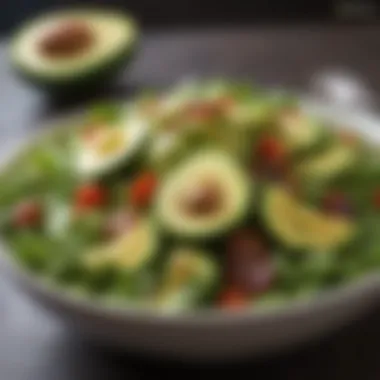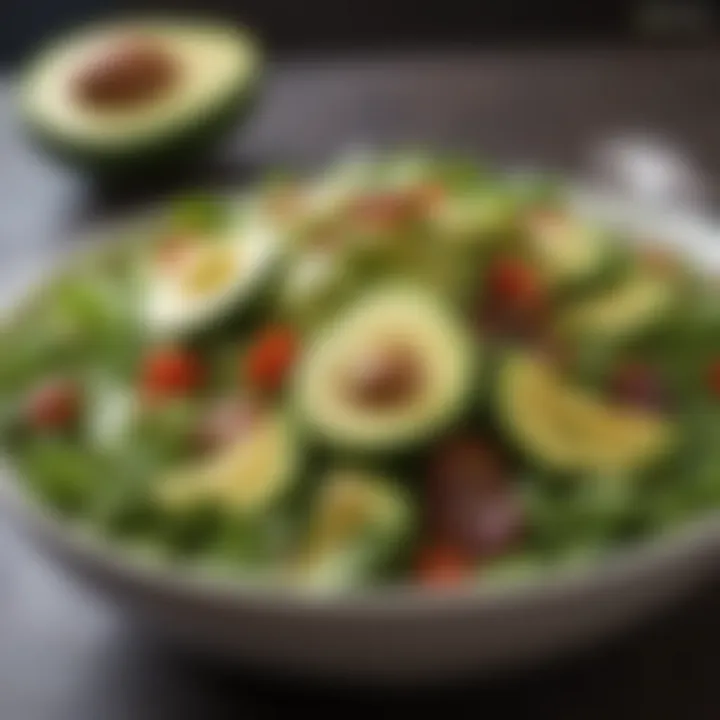Unlocking Fat Loss Potential: The Ultimate Guide to Vegetarian Diet Mastery


Beauty Tips and Tricks
Haircare Hacks
Maintaining a balanced vegetarian diet can also have benefits for your hair. Consuming foods high in vitamins and minerals, such as leafy greens, nuts, and seeds, promotes hair growth and strength. Including plant-based sources of protein, like legumes and tofu, can aid in maintaining healthy hair. Furthermore, avoiding excessive consumption of processed foods and sugary snacks can contribute to a healthier scalp and hair.
Makeup Application Techniques
While makeup may not directly influence fat loss, the way you apply it can complement your journey towards a healthier lifestyle. Opt for cosmetics that are cruelty-free and made from natural ingredients to align with your plant-based diet. Experiment with different makeup techniques to enhance your features and boost your confidence as you work towards achieving your fat loss goals with a vegetarian diet.
Introduction
In the realm of health and wellness, the exploration of optimal strategies for achieving fat loss has garnered significant attention. This article delves into the realm of fat loss through the lens of a vegetarian diet. Within the broader landscape of nutrition, the significance of adopting a vegetarian approach for individuals seeking to reduce body fat becomes increasingly evident. By dissecting the intricate interplay between dietary choices and fat metabolism, we unearth the nuanced benefits and considerations of incorporating plant-based eating into one's journey towards a leaner physique.
Understanding Fat Loss
The concept of fat loss is intricately woven into the fabric of overall health and well-being. As individuals strive to attain their ideal body composition, a fundamental understanding of how the body stores and utilizes fat is paramount. Delving into the biochemical processes underlying fat metabolism provides a foundational knowledge that empowers individuals on their quest for a healthier and leaner physique. By unraveling the mysteries of fat loss, we equip ourselves with the tools necessary to navigate the complexities of shedding excess body fat.
Importance of Diet in Fat Loss
Dietary patterns play a pivotal role in the realms of fat loss and body composition. Amidst the myriad strategies touted for weight management, the significance of one's eating habits stands out as a crucial determinant of success. In the pursuit of shedding unwanted fat, an emphasis on a well-rounded and nutritionally dense diet emerges as a non-negotiable element. By acknowledging the profound impact of dietary choices on the body's ability to burn fat efficiently, individuals can harness the power of food as a catalyst for achieving their fat loss goals.
Vegetarianism as a Fat Loss Strategy


Vegetarianism emerges as a compelling strategy in the realm of fat loss, offering a wealth of benefits to those seeking to lean down. By centering one's meals around plants, legumes, whole grains, fruits, nuts, and seeds, individuals can tap into a sustainable and nutrient-rich approach to shedding excess body fat. The inherent fiber, vitamins, and minerals abundant in plant-based foods not only support satiety and overall health but also foster an environment conducive to fat burning. Embracing vegetarianism as a fat loss strategy opens up a world of culinary possibilities while propelling individuals towards their desired body composition goals.
Nutritional Foundations for Fat Loss
Protein, a fundamental nutrient in any diet, becomes particularly significant when focusing on fat loss. It is renowned for its ability to promote satiety, preserve lean muscle mass, and boost metabolic rate, all of which are advantageous for individuals looking to shed excess fat. Choosing protein-rich vegetarian sources such as legumes, tofu, tempeh, and quinoa can enhance fat loss outcomes while providing essential amino acids necessary for bodily functions.
Fiber, another pivotal nutrient in the realm of fat loss, aids in promoting fullness, regulating blood sugar levels, and supporting digestive health. By incorporating a variety of fiber-rich foods like fruits, vegetables, whole grains, and seeds into a vegetarian meal plan, individuals can effectively manage their weight and improve overall health.
Healthy fats, despite misconceptions, are crucial for optimal bodily functions and, interestingly, can support fat loss. Unsaturated fats found in sources like avocados, nuts, and olive oil offer numerous health benefits, including improved heart health and reduced inflammation. When included in moderation as part of a vegetarian diet, healthy fats can contribute to satiety, nutrient absorption, and energy production.
Complex carbohydrates, often misunderstood, are essential for providing sustained energy levels and supporting metabolic processes during fat loss. Foods rich in complex carbs, such as whole grains, legumes, and starchy vegetables, offer a steady release of energy, preventing energy dips and promoting efficient fat utilization in the body.
Lastly, the inclusion of vitamins and minerals is crucial for overall health and well-being during a fat loss journey. These micronutrients support various physiological functions, including energy metabolism, immune function, and cellular repair. Maintaining a diverse selection of fruits, vegetables, nuts, and seeds in a vegetarian meal plan can ensure an adequate intake of essential vitamins and minerals necessary for supporting fat loss efforts.
Designing a Vegetarian Meal Plan
Balanced Meal Components
Vegetables
Vegetables play a pivotal role in a vegetarian meal plan geared towards fat loss. These nutrient-dense foods are rich in essential vitamins, minerals, antioxidants, and fiber, promoting satiety and overall well-being. Incorporating a variety of colorful vegetables such as leafy greens, bell peppers, broccoli, and carrots ensures a robust micronutrient profile, supporting metabolic functions and aiding in digestion. Their low calorie and high fiber content make vegetables a valuable asset in weight management, as they help individuals feel full while controlling calorie intake, contributing to fat loss goals.
Legumes
When constructing a vegetarian meal plan for fat loss, legumes serve as an excellent source of plant-based protein, fiber, complex carbohydrates, and micronutrients. Legumes like lentils, chickpeas, black beans, and kidney beans provide a substantial protein punch, enhancing satiety and muscle retention during weight loss. Their fiber content aids in digestion and promotes gut health, while their slow-digesting carbohydrates offer sustained energy levels, crucial for maintaining metabolic rate and preserving lean body mass.


Whole Grains
Whole grains are essential components of a well-rounded vegetarian meal plan, contributing complex carbohydrates, fiber, vitamins, and minerals. Including whole grains such as quinoa, brown rice, oats, and whole wheat bread provides a sustained release of energy, preventing blood sugar spikes and crashes. Their fiber content supports digestive health and regulates hunger, helping individuals stay full for longer periods and avoid potential overeating, which can impede fat loss progress.
Fruits
Fruits are natural sources of vitamins, minerals, antioxidants, and fiber, making them valuable additions to a vegetarian meal plan focused on fat loss. Incorporating a variety of fruits such as berries, apples, citrus fruits, and bananas not only satisfies sweet cravings but also provides essential nutrients to support overall health and well-being. The natural sugars in fruits offer a healthier alternative to processed sweets, aiding in controlling cravings and reducing the consumption of empty calories, thus facilitating the fat loss process.
Nuts and Seeds
Nuts and seeds offer a powerhouse of nutrients, including healthy fats, protein, fiber, vitamins, and minerals, making them valuable components in a vegetarian meal plan for fat loss. Almonds, chia seeds, walnuts, and flaxseeds are rich in omega-3 fatty acids, which support heart health and inflammation reduction. Their protein and fiber content promotes satiety, helping individuals manage hunger pangs and regulate their overall caloric intake, supporting the attainment of fat loss goals.
Lifestyle Factors and Fat Loss
Lifestyle factors play a pivotal role in the pursuit of effective fat loss through a vegetarian diet. Engaging in a holistic approach to wellness encompasses not only dietary choices but also lifestyle habits that can significantly impact weight management. By comprehensively addressing these elements, individuals can optimize their fat loss journey.
Physical Activity
Physical activity is one of the fundamental pillars of a successful fat loss regimen. Regular exercise not only aids in burning calories but also helps in preserving lean muscle mass, which is crucial for sustaining weight loss in the long term. Incorporating a diverse range of activities, including cardio, strength training, and flexibility exercises, ensures overall fitness and calorie expenditure. Additionally, physical activity enhances metabolism, contributing to improved fat utilization by the body.
Stress Management
Effective stress management is paramount for achieving optimal fat loss results. Chronic stress can lead to elevated levels of cortisol, a hormone that promotes fat storage, especially in the abdominal region. Implementing stress-reducing practices such as mindfulness, meditation, or yoga can mitigate the impact of stress on weight management. By fostering emotional well-being and reducing stress levels, individuals can support their body's ability to burn fat efficiently.


Adequate Sleep
Adequate sleep is a cornerstone of a healthy lifestyle and is closely linked to successful fat loss. During sleep, the body undergoes crucial processes involved in metabolism, hormone regulation, and repair. Lack of sleep disrupts these functions, leading to hormonal imbalances that can hinder weight loss efforts. Prioritizing quality sleep of 7-9 hours per night promotes optimal metabolic function, appetite regulation, and overall well-being, facilitating effective fat loss.
Tracking Progress and Adjusting
Tracking progress and adjusting are vital components in the journey of optimizing fat loss through a vegetarian diet. By monitoring changes in body composition, dietary habits, and overall health, individuals can make informed decisions to fine-tune their approach for better results. Keeping track of key metrics such as weight, body fat percentage, and muscle mass provides valuable insights into the effectiveness of the chosen dietary plan. Regularly reassessing and adjusting one's diet and activity levels based on these metrics is crucial for maintaining progress and overcoming plateaus.
Monitoring Body Composition
Monitoring body composition is a fundamental aspect of tracking progress in fat loss. By regularly assessing parameters such as weight, body fat percentage, and muscle mass, individuals can gain a comprehensive understanding of how their body is responding to dietary changes. Understanding these metrics allows for the identification of trends, such as reductions in fat mass and increases in lean muscle mass, indicating successful fat loss. Monitoring body composition facilitates the implementation of targeted interventions to optimize fat loss, such as adjusting macronutrient ratios or calorie intake to support specific goals.
Fine-Tuning Your Diet
Fine-tuning your diet is an essential step towards maximizing fat loss results on a vegetarian diet. Analyzing dietary patterns, nutrient intake, and meal structure can help individuals identify areas for improvement and optimization. Fine-tuning involves adjusting portion sizes, food choices, and meal timings to ensure the body is receiving adequate nutrition while maintaining a calorie deficit for fat loss. By incorporating diverse and nutrient-dense foods into the diet, individuals can enhance satiety, metabolism, and overall well-being, supporting sustainable fat loss goals.
Seeking Professional Guidance
Seeking professional guidance is a valuable strategy for individuals looking to optimize fat loss effectively. Consulting with nutritionists, dieticians, or healthcare professionals can provide personalized insights and recommendations tailored to individual needs and goals. A professional can help individuals navigate dietary challenges, address nutrient deficiencies, and design meal plans that align with their fat loss objectives. Additionally, guidance from experts can offer accountability, reassurance, and motivation throughout the fat loss journey, fostering long-term success and health outcomes.
Sustainability and Long-Term Results
In the realm of fat loss through a vegetarian approach, sustainability and long-term results stand as pillars of success. Establishing sustainable dietary and lifestyle habits is paramount for lasting effects on body composition. By focusing on creating a nourishing and well-rounded meal plan, individuals can maintain weight loss achievements over time. Sustainability entails consistency in consuming a variety of nutrient-dense plant-based foods to support overall health while actively working towards fat loss goals. Long-term results are not just about shedding excess weight but about cultivating a balanced way of eating that can be upheld for years to come. The enduring nature of a vegetarian diet in promoting fat loss and well-being underlines the significance of incorporating sustainability and long-term thinking in dietary choices for lasting benefits.
Creating Healthy Habits
Developing healthy habits goes hand in hand with achieving and sustaining fat loss through a vegetarian diet. Establishing a routine of mindful eating, regular physical activity, and adequate hydration are crucial components in fostering a healthy lifestyle. Creating healthy habits involves making conscious choices to prioritize nutrition and self-care, which includes planning balanced meals rich in essential nutrients. By instilling habits that support overall well-being, individuals can enhance the effectiveness of their fat loss journey and contribute to long-term success.
Celebrating Achievements
Celebrating achievements along the fat loss journey is essential for maintaining motivation and momentum. Recognizing and rewarding progress, whether it be reaching a certain weight loss milestone or sticking to a new meal plan, can boost confidence and inspire further dedication. Celebrating achievements reinforces positive behavior changes and enhances the satisfaction derived from making healthy choices. It serves as a valuable reminder of the progress made, instilling a sense of accomplishment and encouraging perseverance towards reaching ultimate health goals.







